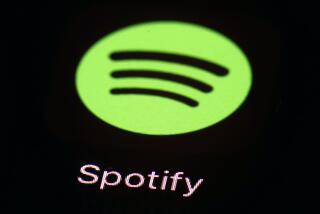Spotify acquires New York podcasting companies Gimlet and Anchor
Spotify said Wednesday it would acquire New York podcasting companies Gimlet Media and Anchor FM Inc., establishing itself as a major player in podcasting, a once-nascent category that has emerged as a booming industry.
The Swedish music company did not disclose the financial terms of the deal but said it planned to spend $400 million to $500 million on podcast-related acquisitions this year, a total that includes the Anchor and Gimlet purchases as well as other deals Spotify is pursuing.
For the record:
9:00 a.m. Feb. 6, 2019An earlier version of this article referred to Spotify’s CEO as Daniel Elk. His name is Daniel Ek.
Analysts said the move further cements podcasts as an important category for streaming music platforms such as Spotify and Pandora, as both companies seek to grow their audiences through ad-supported and subscription-based memberships. Advertising spent on podcasts is expected to climb 28% to $514.5 million this year, according to estimates in a report by Interactive Advertising Bureau and PwC.
“It’s further validation that podcasting is here to stay,” said Marlon Nichols, a managing partner at Cross Culture Ventures, a Culver City firm that invested in Gimlet.
Matthew Thornton, a director of equity research at SunTrust Robinson Humphrey, said: “A very small industry just gets big quicker.”
Spotify says podcast listeners spend twice as much time on the platform and that the medium has helped bring in new users. Chief Executive Daniel Ek said he believed that eventually more than 20% of all time spent on Spotify would be on non-music content.
“While podcasting is still a relatively small business today, I see incredible growth potential in this space,” Ek said on a call with investors Wednesday morning.
Also on Wednesday, Spotify reported net income of $502.9 million in the fourth quarter, compared with a loss of $678.1 million a year earlier. The company also recorded its first-ever quarterly operating profit, at $107 million.
Revenue was up 30% to nearly $1.7 billion for the quarter. Spotify’s shares fell $3.95, or 2.8%, to $135.45 on Wednesday, because the acquisitions were expected to lower the company’s margins, analysts said.
The expansion into podcasting comes as Spotify seeks to increase the amount of content on its platform, as rivals in the streaming-music space are closing in on its lead.
Launched in 2008, Spotify lets users stream their chosen audio for free with ads or ad-free with a subscription. In the fourth quarter, Spotify had 207 million monthly active users and 96 million premium subscribers. But competitors have steadily grown. They include Apple Music, which launched in 2015 and now has more than 50 million paid subscribers.
Pandora, owned by SiriusXM, also has invested in the podcast space, using its technology to recommend podcasts for its listeners. Exclusive podcasts on Pandora include the third season of “Serial.” The streaming platform had about 69 million active users and nearly 7 million paid subscribers in the quarter that ended Sept. 30.
With its podcast acquisitions, Spotify has the potential to provide exclusive non-music content in a way that is similar to Netflix providing exclusive shows on its platform, analysts said.
“This is just a huge move,” said BTIG Research media analyst Rich Greenfield. “Exclusives in the music world just do not work. Podcasting exclusives absolutely can work, especially in a scaled platform.”
Analysts said that Spotify’s investment in podcasting would bring more legitimacy to an audio medium that was growing but had become increasingly more difficult to navigate for users. Many people today find podcasts through Apple’s Podcast app, but Spotify has the potential to emerge as a major podcast player especially within the Android operating system, which is used by vastly more mobile-device users worldwide.
“We have the opportunity to make original content the way Netflix does and to utilize the catalog content we have in the platform to help bring people to the podcast space,” Dawn Ostroff, Spotify’s chief content officer, said in an interview.
In its earnings letter to shareholders, Spotify said podcasts were part of its strategy for faster revenue growth. The acquisitions may also help reduce the money that Spotify pays to labels by cutting its music-streaming fees, some analysts said.
“If the Spotify listener converts from 100% music to even 90% music, 10% podcasts — that’s a 10% decrease in checks cut to other entities on behalf of that listener,” Tom Webster, a senior vice president at Edison Research, wrote in a blog post. Webster said Spotify’s move into podcasting also could push more labels to become more open to letting podcasts use licensed music.
Spotify executives said it would employ its most recent acquisitions to bring more content to its platform. Already, more than 185,000 podcast titles are on Spotify, and in the fourth quarter, 14 of those were exclusives.
Gimlet has produced several popular podcasts, including “Homecoming,” a drama about a rehabilitation program for former military members that was made into an Amazon show starring Julia Roberts. Gimlet spokesman Kevin Turner said the New York company’s 120 employees would be joining Spotify.
“We are still at the dawn of the second golden age of audio, and we know Spotify is a perfect partner and platform to take Gimlet — and podcasting at large — to a new level,” Gimlet founders Alex Blumberg and Matt Lieber said in a statement.
Spotify and Gimlet declined to comment on the acquisition price. But a person familiar with the situation said Spotify paid about $230 million for Gimlet. Gimlet had raised $27.7 million in funding, according to research firm CB Insights.
The deal is Spotify’s largest to date since its 2014 acquisition of Echo Nest, a Massachusetts music data firm, for $100 million, a CB Insights report shows.
Anchor, also based in New York, is a platform that provides tools for podcasters to monetize and distribute their programs.
The deals are expected to close in the first quarter.
Analysts said they expect to see more consolidation in the space.
“Spotify has thrown down the gauntlet,” said Thornton of SunTrust Robinson Humphrey, adding that the streaming music company is not just investing in content but building its own podcasts. That sends the message that “if you want to be in this game, you better start building that muscle,” Thornton said.
Twitter: @thewendylee
More to Read
Inside the business of entertainment
The Wide Shot brings you news, analysis and insights on everything from streaming wars to production — and what it all means for the future.
You may occasionally receive promotional content from the Los Angeles Times.







